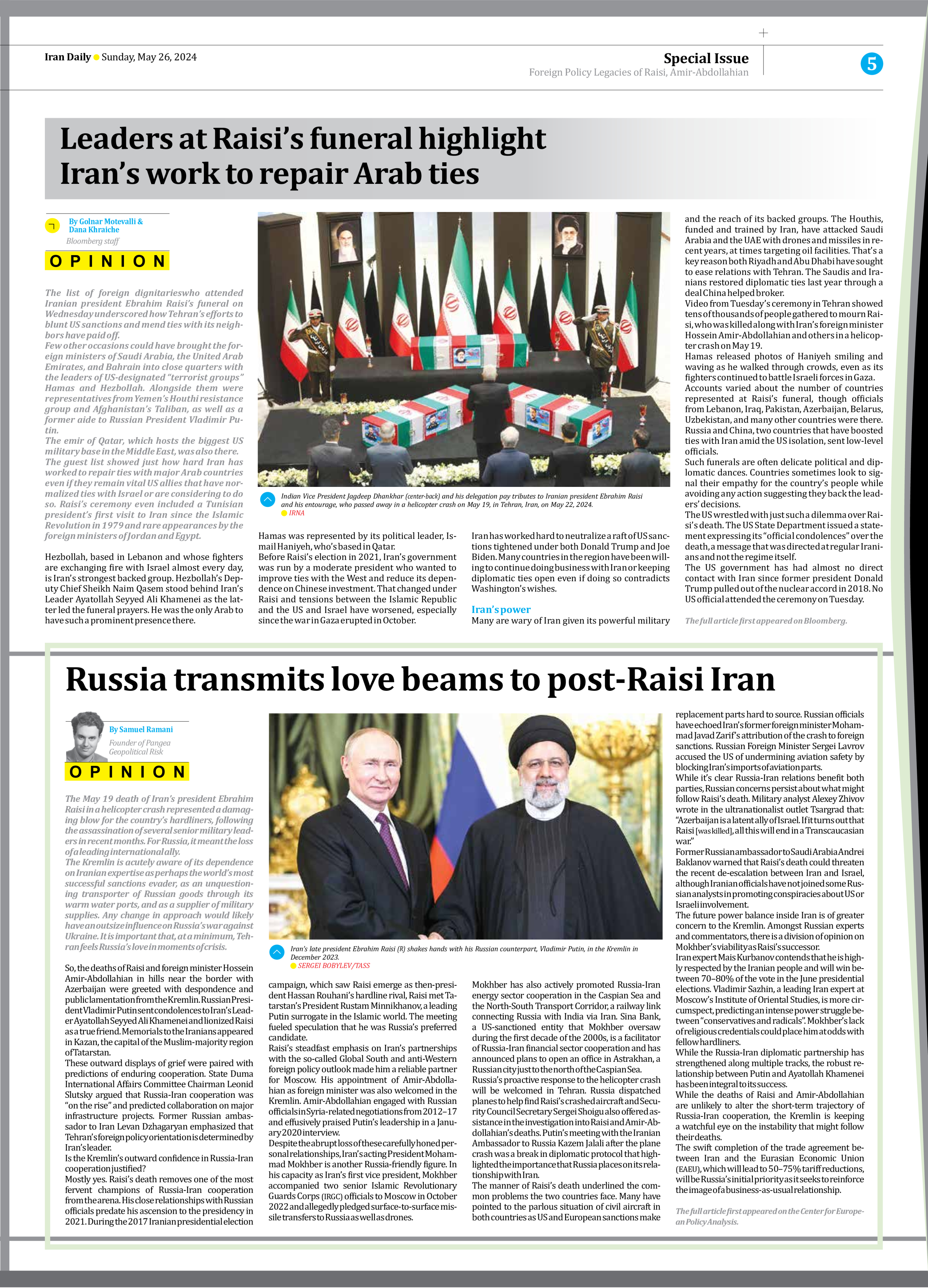
Leaders at Raisi’s funeral highlight Iran’s work to repair Arab ties
By Golnar Motevalli & Dana Khraiche
Bloomberg staff
The list of foreign dignitarieswho attended Iranian president Ebrahim Raisi’s funeral on Wednesday underscored how Tehran’s efforts to blunt US sanctions and mend ties with its neighbors have paid off.
Few other occasions could have brought the foreign ministers of Saudi Arabia, the United Arab Emirates, and Bahrain into close quarters with the leaders of US-designated “terrorist groups” Hamas and Hezbollah. Alongside them were representatives from Yemen’s Houthi resistance group and Afghanistan’s Taliban, as well as a former aide to Russian President Vladimir Putin.
The emir of Qatar, which hosts the biggest US military base in the Middle East, was also there.
The guest list showed just how hard Iran has worked to repair ties with major Arab countries even if they remain vital US allies that have normalized ties with Israel or are considering to do so. Raisi’s ceremony even included a Tunisian president’s first visit to Iran since the Islamic Revolution in 1979 and rare appearances by the foreign ministers of Jordan and Egypt.
Hezbollah, based in Lebanon and whose fighters are exchanging fire with Israel almost every day, is Iran’s strongest backed group. Hezbollah’s Deputy Chief Sheikh Naim Qasem stood behind Iran’s Leader Ayatollah Seyyed Ali Khamenei as the latter led the funeral prayers. He was the only Arab to have such a prominent presence there.
Hamas was represented by its political leader, Ismail Haniyeh, who’s based in Qatar.
Before Raisi’s election in 2021, Iran’s government was run by a moderate president who wanted to improve ties with the West and reduce its dependence on Chinese investment. That changed under Raisi and tensions between the Islamic Republic and the US and Israel have worsened, especially since the war in Gaza erupted in October.
Iran has worked hard to neutralize a raft of US sanctions tightened under both Donald Trump and Joe Biden. Many countries in the region have been willing to continue doing business with Iran or keeping diplomatic ties open even if doing so contradicts Washington’s wishes.
Iran’s power
Many are wary of Iran given its powerful military and the reach of its backed groups. The Houthis, funded and trained by Iran, have attacked Saudi Arabia and the UAE with drones and missiles in recent years, at times targeting oil facilities. That’s a key reason both Riyadh and Abu Dhabi have sought to ease relations with Tehran. The Saudis and Iranians restored diplomatic ties last year through a deal China helped broker.
Video from Tuesday’s ceremony in Tehran showed tens of thousands of people gathered to mourn Raisi, who was killed along with Iran’s foreign minister Hossein Amir-Abdollahian and others in a helicopter crash on May 19.
Hamas released photos of Haniyeh smiling and waving as he walked through crowds, even as its fighters continued to battle Israeli forces in Gaza.
Accounts varied about the number of countries represented at Raisi’s funeral, though officials from Lebanon, Iraq, Pakistan, Azerbaijan, Belarus, Uzbekistan, and many other countries were there. Russia and China, two countries that have boosted ties with Iran amid the US isolation, sent low-level officials.
Such funerals are often delicate political and diplomatic dances. Countries sometimes look to signal their empathy for the country’s people while avoiding any action suggesting they back the leaders’ decisions.
The US wrestled with just such a dilemma over Raisi’s death. The US State Department issued a statement expressing its “official condolences” over the death, a message that was directed at regular Iranians and not the regime itself.
The US government has had almost no direct contact with Iran since former president Donald Trump pulled out of the nuclear accord in 2018. No US official attended the ceremony on Tuesday.
The full article first appeared on Bloomberg.







